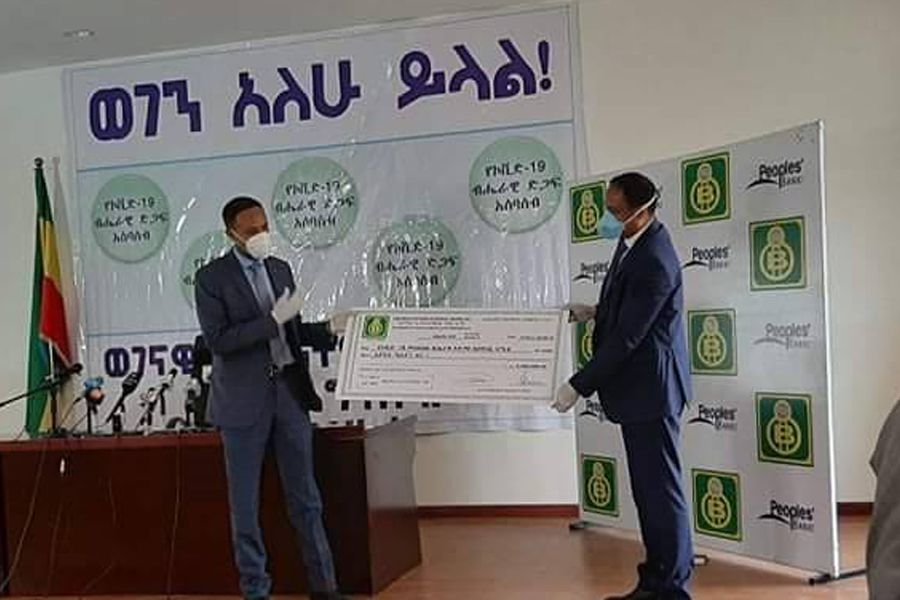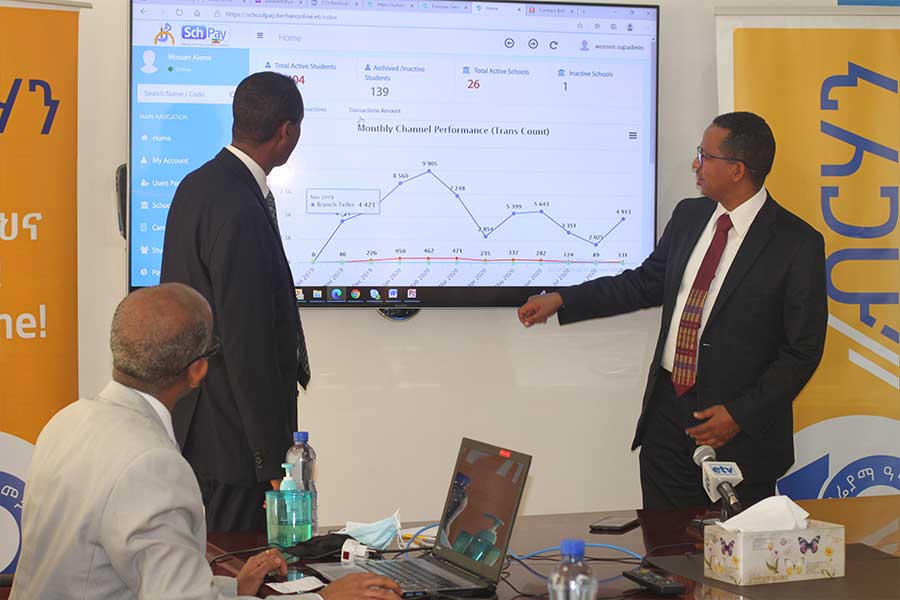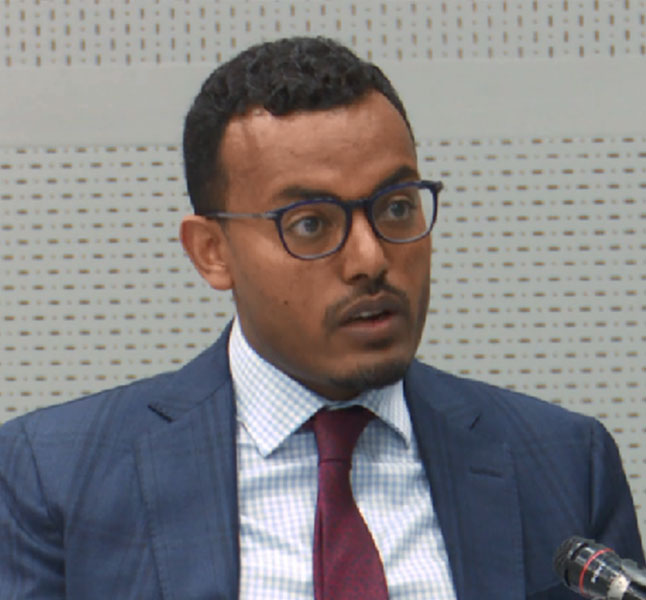
Covid-19 | Apr 01,2020
A new tracking device developed by a federal information network intelligence agency is where Feto Esimo (PhD) hinges all his hopes to see through the success of a program he has been working on for years. A Director General of the Ethiopian Institute of Agricultural Research (EIAR), he expects the devices to help battle a flourishing contraband trade in wheat, causing a growing concern to federal officials.
Feto fears it is impossible to meet domestic demand for wheat as long as contraband trade remains unabated. He turned to the Information Network Security Agency (INSA) to subdue a growing illicit wheat export trade with a crop tracking system a consortium of federal agencies to implement. The Geospatial Information Agency and the Federal Cooperative Agency will team up with the Institute fitting trucks transporting wheat harvested under off-season irrigation with tracking devices.
Prime Minister Abiy Ahmed's (PhD) administration initiated the off-season farming programme two years ago, pledging to substitute wheat imports. This year, close to half a million hectares of land were farmed under cluster and off-season farming initiatives. Officials expect to see 16 million quintals of wheat harvested, facilitating agricultural inputs provision and equipment to smallholder farmers engaged in irrigation farming. A hefty 400 million Br budget has been apportioned to the programme this year.
However, the efforts are undermined by a growing practice of exporting wheat illegally, according to Feto.
"[The culprits] use the foreign currency to finance import businesses," he said.
Feto, who previously lectured at Hawassa University, has led the programme since its inception while serving as director-general of the Oromia Agricultural Research Institute. The Oromia Regional State is home to nearly 260,000hct cultivated under the programme, while the participants in the Amhara Regional State grow crops on 28,000hct. Grains are among the major commodities sold through illicit cross-border trade. Others include livestock, fabric and electronics.
The past decade has seen large volumes of wheat imported to stabilise the market and provide welfare to low-income households. Imports have nearly tripled to 1.7 million tonnes annually over the last 10 years. Financing the procurements has put pressure on the federal budget. In the five years beginning 2012, the federal government spent 33.7 billion Br to ship in a little over 4.1 million tonnes of wheat. Expenditure in 2017 jumped to 10.4 billion Br.
Domestic wheat production is sufficient to cover two-thirds of demand. According to official data, farmers harvested close to 336 million tons of grain during the Meher season from off-season irrigated wheat, of which 16.2 million tons were from off-season irrigated wheat harvested on 405,000hct.
The government's attempt to fill the gap by buying wheat from international suppliers has been rocky. Last year, two international suppliers saw their contracts cancelled due to defaults or contractual breaches. The troubles are likely to worsen because of the war in Eastern Europe. Russia and Ukraine account for nearly a third of global wheat exports. As the armed conflict evolves and trade sanctions set in, other countries have begun to ban the export of major grain crops. India, the world's second-largest wheat producer, is among them.
“There's a severe shortage of wheat in the international market,” said Feto. “We need to safeguard what we are producing.”
The tracking system is designed with the hope that it keeps an eye on the supply chain. Behailu Adugna, director of the cyber development division at INSA, says it keeps tabs on the type of crop cultivated, the size of the plot of land covered by crops, and the harvest to expect.
“Once the harvest is collected, the system monitors whether it passes through legal channels,” he said.
Close to 10 experts are involved in the project at the Agency.
The Geospatial Institute takes aerial photography to measure harvest size and volumes before passing the data along to the Institute. The Cooperative Agency informs about the system to smallholder farmers organised under the 80,000 cooperative unions.
The crop tracking system has been piloted in three weredas in the Oromia Regional State. Before going to market centres, trucks equipped with global positioning system (GPS) devices transport wheat from farmland to warehouses under cooperative unions. Feto and federal officials plan to use close to 300 trucks equipped with GPS. However, those involved in the GPS tracking business have doubts about the plans.
"Nearly all previous attempts failed to bring the desired outcome," said Solomon Kassa, general manager of Kassa Software Tracking Plc. "I don't think it'll be any different."
Solomon refers to a law introduced by the Customs Commission three years ago, compelling cargo truck owners to install GPS devices. Over 1,200 trucks have been fitted with the devices since. The federal government also introduced laws that mandated the installation of speed-limit devices on new vehicles in 2019.
Kassa Software Tracking, incorporated eight years ago with an initial capital of 1.2 million Br, has installed GPS integrated speed limits and GPS fleet management systems on close to 2,000 vehicles.
Although it is possible to monitor and manage fleets by installing GPS devices, Solomon argued the tracking system's success depends on the availability of a centralised monitoring facility. According to Solomon, in the absence of such a facility, "GPS tracking is as good as frivolous."
PUBLISHED ON
[ VOL
, NO
]

Covid-19 | Apr 01,2020

Fortune News | Sep 11,2020

Fortune News | Dec 02,2023

Radar | Jan 21,2023

Commentaries | Apr 16,2022

Radar | Jan 07,2023

Fortune News | Jun 14,2020


Fortune News | Dec 02,2023

Fortune News | Sep 26,2021

Jul 13 , 2024 . By AKSAH ITALO
Investors who rely on tractors, trucks, and field vehicles for commuting, transportin...

Jul 13 , 2024 . By MUNIR SHEMSU
The cracks in Ethiopia's higher education system were laid bare during a synthesis re...

Jul 13 , 2024 . By AKSAH ITALO
Construction authorities have unveiled a price adjustment implementation manual for s...

Jul 13 , 2024
The banking industry is experiencing a transformative period under the oversight of N...

Jul 20 , 2024
In a volatile economic environment, sudden policy reversals leave businesses reeling...

Jul 13 , 2024
Policymakers are walking a tightrope, struggling to generate growth and create millio...

Jul 7 , 2024
The federal budget has crossed a symbolic threshold, approaching the one trillion Bir...

Jun 29 , 2024
In a spirited bid for autonomy, the National Bank of Ethiopia (NBE), under its younge...